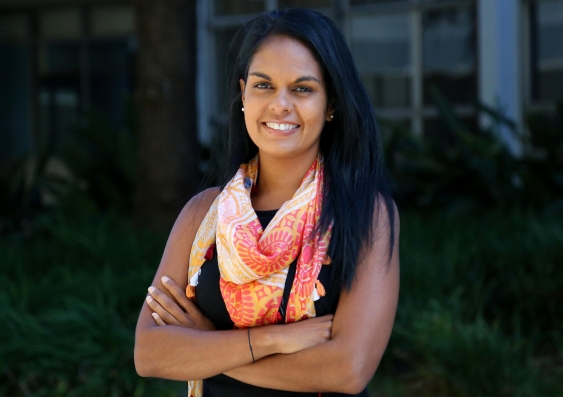Discovering the art of advocacy
Inspired by her family's Aboriginal activism, Teela Reid has switched teaching for law and landed a coveted role working for Supreme Court Justice Lucy McCallum.
Inspired by her family's Aboriginal activism, Teela Reid has switched teaching for law and landed a coveted role working for Supreme Court Justice Lucy McCallum.

Teela Reid had always been inspired by a family history of Aboriginal rights activism, but it was her experience at the United Nations in New York that gave her the courage to swap a career in teaching for law.
Teela, a Wiradjuri woman from Gilgandra, is in her final year of the Juris Doctor at UNSW Law and was recently made tipstaff to Justice Lucy McCallum in the NSW Supreme Court – a highly competitive and prestigious appointment.
She started out her career as a high school sports teacher, passionate about empowering young people. But a teaching exchange to Canada’s University of Victoria gave her new direction.
“Living abroad encouraged me to think about the similarities and differences of Canadian First Nations and my own people and our rights,” says Teela.
“I knew if I really wanted to have an impact on decision-making and change the system, studying law was the direction I needed to head.”
While teaching, Teela was selected as a delegate to the United Nations’ World Indigenous Youth Caucus and “that really gave me courage to leave my job and become a lawyer.”
She’s certainly made an impression at UNSW Law, founding the Inaugural Mooting Competition of Australia’s First Peoples in 2014. In a moot, students present a legal argument against an opposing counsel and before a judge to practice the application of legal theory.
Dean of UNSW Law Professor David Dixon describes it as “one of the brightest highlights of the year in the Law School” and a credit to Teela’s leadership.
“She is a very proud Aboriginal woman who speaks with great insight and power about living and working in non-Aboriginal contexts and institutions. I have learnt a lot from speaking to her,” says Dixon.
Teela says the mooting competition was a “standout moment” for her, showcasing the quality advocacy skills of UNSW Law’s Aboriginal and Torres Strait Islander students and challenging “the perception that we don’t necessarily want to pursue advocacy”.
“It was about providing a culturally significant and safe space for our students to test their legal knowledge and discover the art of advocacy,” she says.
“There is no other moot in Australia of its kind and I would like to see it grow into an intervarsity and even international competition.”
Both her grandfather and great-grandmother were “fierce advocates” for Aboriginal rights and Teela says she feels “fortunate to be in a position to keep their legacy alive”.
“I’ll never forget my roots,” she says. “I think it’s easy to get caught up in the industry, it’s extremely competitive and fast-paced so it’s important to stay grounded in my culture.”
Teela chose UNSW Law for its focus on social justice, reputation for cultivating prominent Aboriginal lawyers, and the special cultural, social and academic support on offer through the faculty and Nura Gili, the University’s Indigenous Programs Unit.
“I believe my mob’s experiences studying law are very different from our peers’ and the Law School and Nura Gili are extremely responsive to this. There is a positive commitment to ensure Aboriginal and Torres Strait Islander students not only survive, but thrive.”
Teela, a paralegal at Gilbert + Tobin and holder of the UNSW Juris Doctor Scholarship for Indigenous Students, is a competitive basketballer, touch football player and marathon-runner who says she will “give any sport a go.”
She was elected this year’s Vice President (Social Justice) of the UNSW Law Society, but says she doesn’t consider herself a leader.
“I feel privileged to be at a law school with many other aspiring Aboriginal and Torres Strait Islander lawyers and really want each of them to succeed. They constantly inspire me and are aware of our responsibilities to our people,” she says.
After graduation she will start work with Justice McCallum and is looking forward to “gaining insight into a world that is still very foreign to me”. Eventually, she hopes to work at the Aboriginal Legal Service or Legal Aid and “maybe one day, the Bar”.
“I was compelled to study law because of my passion for human rights,” she says.
“My dream job would be one that ensures I am making a difference to the lives of my people and their experiences within the law.”
Words: Amy Coopes
Media contact: Leilah Schubert, UNSW Media, 02 9385 8107